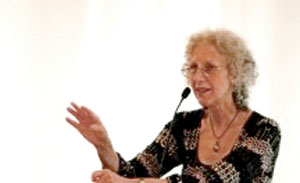
A novelist of the wandering Jew in search of connection
*

Joan Leegant.
Joan Leegant is the author of Wherever You Go, published in July, and An Hour in Paradise, for which she won the PEN/New England Book Award, the Wallant Award for Jewish Fiction, and was a Finalist for the National Jewish Book Award. Formerly an attorney, she taught at Harvard University for eight years. Since 2007, she has lived half the year in Tel Aviv, where she is the visiting writer at Bar-Ilan University and lectures for the U.S. State Department. When not in Israel she lives in Newton. Her latest book, Wherever You Go, portrays three lost souls in the Israel–each in their own way trying to find themselves. I interviewed Leegant on my Somerville Community Access TV Show “Poet to Poet: Writer to Writer.”
Doug Holder: I heard you once shared a pastrami sandwich with Allen Ginsberg, the iconic Beat Generation poet?
Joan Leegant: What I recollect of it—I was a teenager, but I was in awe. This was in the mid 60’s. And he had just completed a performance—he was sort of in his guru stage. He was chanting, etc. So I was sort of surprised when he asked my father Bernie, who was a cousin of his, to get him a pastrami sandwich. This was a serious disconnect for me. I didn’t expect him to be so down-to-earth. He was a very regular guy. He asked how the family was, etc. He was an object of curiosity of course for the family. He hadn’t the huge reputation he would make later on. By-the-way the pastrami was excellent–it was N.Y. pastrami of course!
DH: When did you first go to Israel?
JL: My first trip to Israel was in the 1970’s. I was 27. I stayed for a few years and I was enamored with the country. I really admired its spunk and its community at the time. In the late 70’s I had come out of an anti-war period. Israel had just been involved in two wars in 1967 and 1973, and I was used to the sight of soldiers. I speak the language and have Israeli friends—so I am quite comfortable there.
DH: The three young protagonists in “Wherever You Go” seem like lost souls–they are looking to define themselves. They come to Israel. Is Israel a good place for this?
JL: That basically is the theme of the work. People are seeking to connect to the divine or something larger than themselves. They want to find one little corner of happiness. So people do come to Israel seeking something – and sometimes they find it is available–whether it is religious, political activity, or a sense of belonging.
DH: There are two sisters in the novel Dena and Yona. Dena is a staunch ideologue living in a settlement in the desert. Yona lives in New York (and travels to Israel), is an adulteress, and is trying to reconcile with her estranged sister. Who are you more sympathetic to?
JL: Yona is the character who has a lot more compassion, and she is far more vulnerable. I have more compassion for her.
I do admire but I don’t agree with the politics at all of the sister Dena. She is a very principled person. There is a part of me that really admires people who want to live by their principles, and are passionate about that. But this can turn into fundamentalism. And that is the point of the book.
DH: There is a lot of hostility in the book towards American Jews. Do you feel that when you are in Israel?
JL: I don’t feel it. But I have observed it. I think there is a level in which they are more cynical. The people portrayed in the book are fundraisers for the right wing settlements. And they are aware that the American Jews who financially support the settlements are not going to live there or send their children there. They are not prepared to make the sacrifice to live there. But they will offer their financial support. The people who are willing to accept the money are cynical and that’s who I am portraying. One of them says that the Americans come here and help them out but go back to live in their affluent communities and big houses. I guess some Israelis feel that Jews in the diaspora are not living their destiny in Israel.
DH: You teach writing in Israel at Bar-Ilan University in Tel Aviv. You have also taught writing at Harvard University Extension. How do the students differ? What are the writing about? How do your courses unfold?
JL: I do two things. We do a lot of reading and discuss other authors work. Then we have workshops. Students work is discussed.
Like the Extension School my students in Israel are of an older population. I teach in an Master’s program in Israel–most of the students are native English speakers who are either in the country for the program or live there. This is a program in the English Department of an Israeli University. They are often from South Africa, the United States, Great Britian, etc… Like Harvard Extension they come from diverse backgrounds.
The subject matter they write about is different. Some of my Israeli students come from the army and write about their army experience. Some people have lived in the country for 25 years or more and write about their immigration experience. There is a Jewish women in my class from India, and she writes evocatively about the Jewish community in her native country. So often people write about immigration–the tapestry of the immigrant experience, the Jewish experience, Jewish identity, etc.















Reader Comments